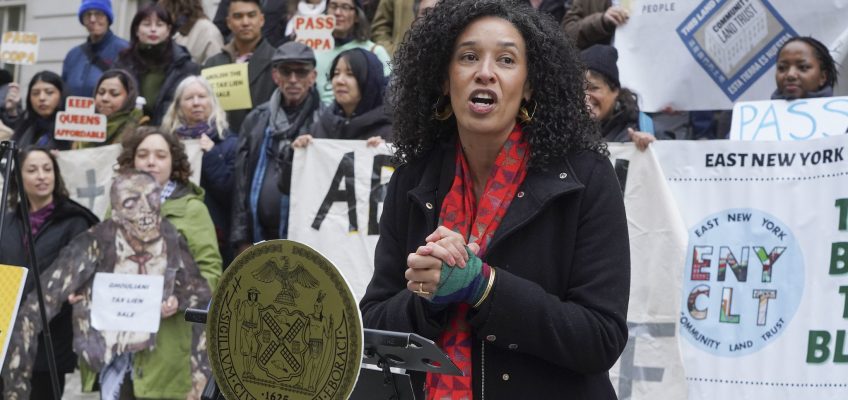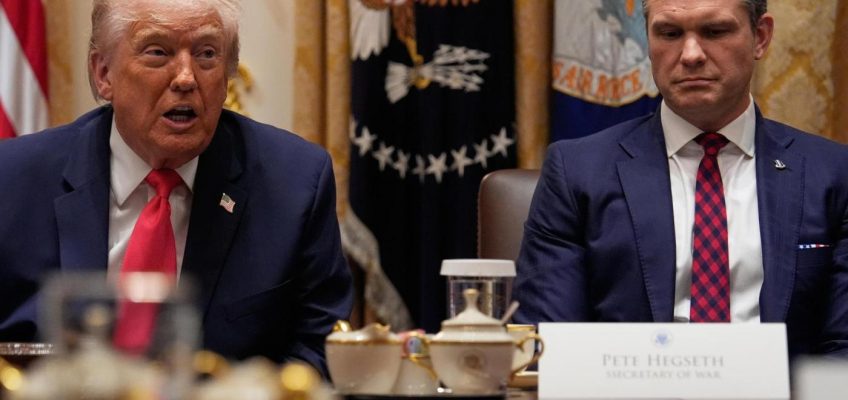“Passing the Community Opportunity to Purchase Act (COPA) in 2025 would send a clear message: city policies must shift power back to tenants and communities, not bolster investors trying to price them out.”
Councilmember Sandy Nurse, COPA’s lead sponsor, at a rally for the bill in November. (Gerardo Romo / NYC Council Media Unit)
The 37th Council District includes neighborhoods that have experienced waves of disinvestment and predatory investment at the hands of the real estate industry for over a century, like East New York. Recently, a group of neighborhood activists formed the East New York Community Land Trust (ENYCLT) to counteract this exploitative cycle, preserve housing affordability, and build generational wealth. Last year, ENYCLT purchased a 20-unit building from a neglectful landlord and is in the process of turning it into an affordable cooperative.
ENYCLT’s proof of concept is just across the East River: New York City’s oldest community land trust, Cooper Square, on the Lower East Side in Manhattan. A product of a multi-decade struggle, Cooper Square formed to fight against Robert Moses’ urban renewal plans and to gain control over their neighborhood’s destiny. Today, the CLT oversees the land beneath 23 buildings, preserving affordability in what has become an expensive neighborhood.
In an expensive real estate market like New York City’s, mission-driven developers like ENYCLT and Cooper Square have trouble competing with deep-pocketed investors. Speculators can move quickly with all-cash offers, closing deals before a non-profit can even assemble financing.
Unfortunately, speculative investment undercuts the quality of the city’s housing stock. As a 2022 report by the Local Initiatives Support Corporation, University Neighborhood Housing Program and New School University showed, buildings with speculative landlords have higher eviction rates and lower housing quality, leading to long term distress. In contrast, affordable housing investments create better-maintained homes.
We believe that the Community Opportunity to Purchase Act (COPA) can help level the playing field between mission-driven developers and speculative investors. COPA would give pre-screened, mission-driven developers the first chance to bid on certain rental buildings when they go up for sale, interrupting the predatory cycle that is causing the quality of our rental housing stock to decline and becoming an important tool for advancing principled, long-term community ownership.
We know COPA works. San Francisco passed a similar law in 2019 and in the years since, the law has proven effective at preserving affordability in rent-controlled buildings. For example, the Mission Economic Development Agency—founded in 1973 to promote equitable economic development for working-class Latino households in San Francisco’s Mission District—has successfully closed eight COPA-facilitated purchases, each one in close partnership with the building’s tenants. These purchases were made possible with a mix of public and private financing.
New York’s version of COPA would similarly leverage existing public financing tools, such as the recently relaunched Neighborhood Pillars program that provides construction and permanent financing, along with property tax exemptions to stabilize and preserve multifamily affordable housing.
New York City was once a leader in converting distressed rental properties into tenant- and community-controlled housing. In the 1980s, the Community Service Society’s* Ownership Transfer Program worked with the city to take buildings away from tax-delinquent slumlords and transfer them into the hands of the tenants who had long endured poor conditions. In recent decades, however, the city has retreated from its commitment to tenant ownership, and has instead allowed financially distressed buildings to be snapped up by corporate conglomerates.
Today, hundreds of thousands of tenants in New York City are rent burdened, and federal cuts threaten to throw even more families into economic instability. COPA offers New York a practical, proven path to help residents stay in their homes, protect neighborhoods from speculative buying, and build long-term community control.
Passing COPA in 2025 would send a clear message: city policies must shift power back to tenants and communities, not bolster investors trying to price them out.
Sandy Nurse is a New York City Council member representing the 37th Council District, which includes neighborhoods of Bushwick, Brownsville, Cypress Hills, Cityline and East New York. David R. Jones, Esq. is President and chief executive officer of the Community Service Society of New York (CSS).
*Editor’s note: Co-author Jones is a City Limits’ board member, and Community Service Society is among City Limits’ funders.
The post Opinion: New York’s Opportunity for Community Ownership appeared first on City Limits.




